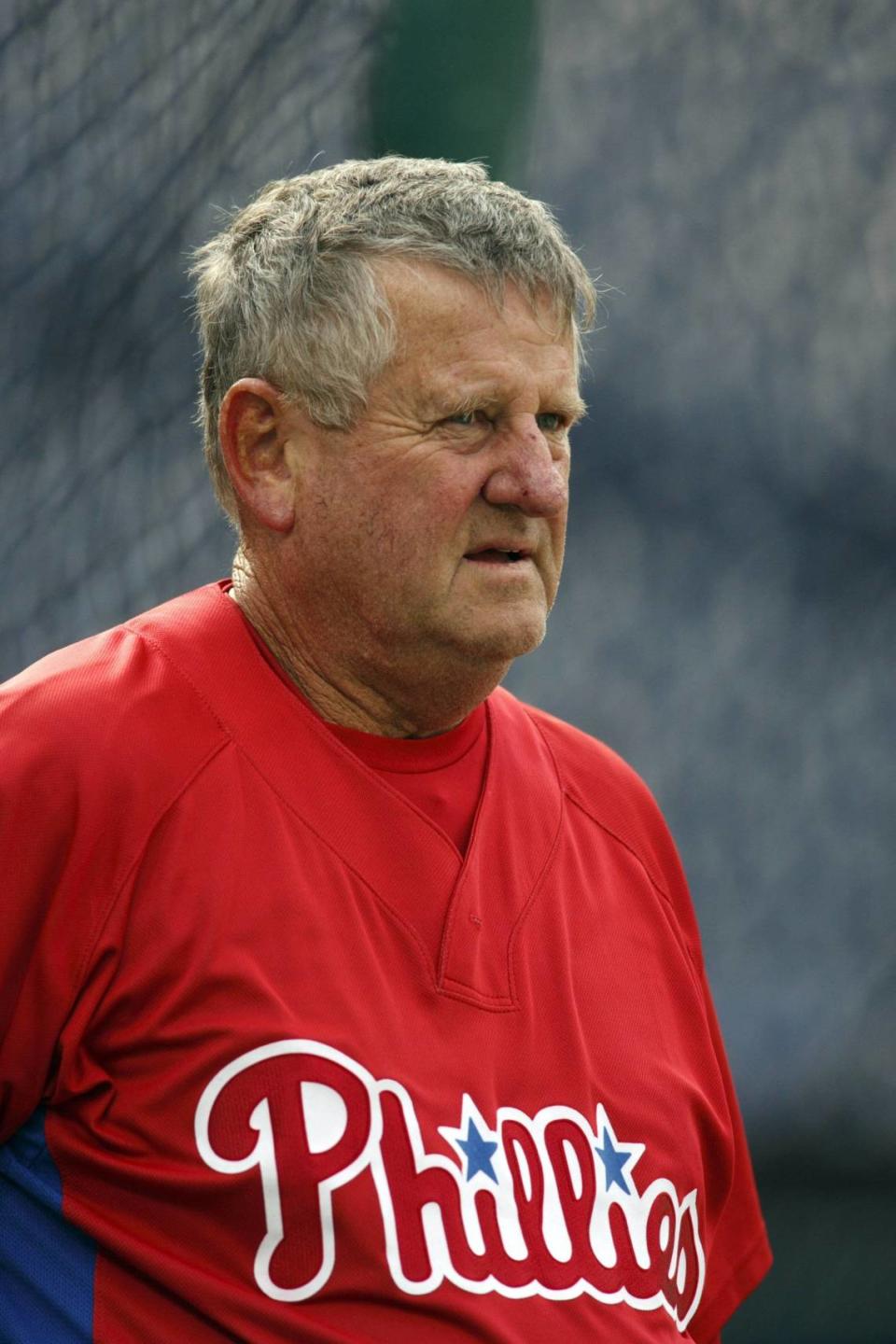Jimy Williams, former MLB manager and SLO County baseball star, dies at 80
- Oops!Something went wrong.Please try again later.
- Oops!Something went wrong.Please try again later.
- Oops!Something went wrong.Please try again later.
Jimy Williams, a 1961 Arroyo Grande High School graduate and Eagles Hall of Famer who went on to make a name for himself as a Major League Baseball manager, has died.
Williams died in Florida on Friday, Jan. 26, at the age of 80, after a short illness, according to news reports.
Williams, who first spelled his name incorrectly as a prank in high school while growing up on his family’s South County farm, has a legacy that carries on to this day, said current Eagles baseball Coach Steve Tolley.
He was inducted into the Arroyo Grande Eagles Athletic Hall of Fame in 2010.
“He’s only Major Leaguer out of Arroyo Grande High School that I’m aware of,” Tolley said. “And there’s not many Major Leaguers who come out of most local high schools anywhere. The odds of making it are really long.”
Williams had a brief stint as a St. Louis Cardinals infielder, playing in 1966 and 1967, recording three hits in 13 at-bats. He got his first MLB hit off star Giants pitcher Juan Marichal.
“I can remember my first big league hit, but when you only get three, you can remember them all,” he once told the Houston Chronicle.
After a shoulder injury cut his playing career short, he went on to manage in the minor leagues before moving up to big league managerial roles with the Toronto Blue Jays, Boston Red Sox and Houston Astros.
He is one of a small group of Central Coast high school baseball players who made a Major League Baseball roster — including Spencer Howard (Templeton), Jeff McNeil (Nipomo High), Robin Ventura (Righetti High in Santa Maria), Mel Queen (San Luis Obispo High), Jim Lonborg (SLO High) and Jason Botts (Paso Robles High), among others.
Recent standout SLO County high school baseball players Brooks Lee (SLO High) and Dylan Beavers (Mission Prep) are expected to make big league rosters in the near future, following in the tradition of Williams and others.
“People like Jimy Williams set the standard,” Tolley said. “He showed that you can make it to the major leagues from a small town. Coaches in this area are trying to work together to make this area known for baseball. We’re working together to see the area elevate and get more kids a chance to play Division 1 baseball. It’s a big goal for all of us.”

An early love for baseball
Williams was born in Santa Maria on Oct. 4, 1943, and grew up on his family’s Arroyo Grande farm, which Tolley said was located near Laeticia Winery, and gravitated to baseball at a young age, according to a 2001 article by former Tribune reporter Dan Ruthemeyer.
Mel Queen and Williams played against each other for years, attending San Luis Obispo High and Arroyo Grande High, respectively.
“(Williams) was a very good player, a very scrappy player,” Queen said in the 2001 story. “He was the kind of guy who didn’t have the greatest of talent but who worked harder than other people.”
“Those are the guys who usually become pretty good managers,” Queen added. “They’ve had to study the game and do every little thing to play at the big league level.”
During his Eagles years from 1958 to 1961, Williams would often get his high school coach Gene “Peewee” Fraser to throw him additional batting practice or hit him a few extra ground balls.
Williams’ sisters would tag along, running down balls for their brother and his coach, Ruthemeyer wrote.
Chris Cajas played second base and Williams was shortstop when Williams hit .381 in his senior season.
“He just did his thing in a natural way to where he was effective. The way he was, the way he played, you could see the ballplayer in him,” said Cajas in 2001. “He didn’t stand out, but you could see he had something in him. Something that was going to get him there.”
Becoming a manager
Despite having to end his professional career due to injury, Williams considered himself fortunate.
“I was lucky to be in a Major League uniform,” he said. “I still feel fortunate, because nobody gives you anything.”
He struck out against the Dodgers’ Sandy Koufax in his first career at-bat in 1966 before getting his first hit against Marichal. Both pitchers are MLB Hall of Famers.
Williams managerial career was launched after he settled into running a 7-Eleven convenience store he bought in St. Louis in the mid-1970s after his playing days ended.
Then he got a call from Tom Sommers, who was in charge of the Angels’ minor league teams.
“I couldn’t sell that 7-Eleven quickly enough,” said Williams, citing Sommers and his Arroyo Grande coach Fraser as his two biggest baseball influences.
He went on to rise up the ranks and coach in high-pressure situations, including in Boston, notorious for critical fans and relentless sports media pressure, amid the Red Sox’ 86-year drought to win a World Series before the team’s sixth World Championship in 2004.
Williams managed the Red Sox from 1997 to 2001. He was voted Manager of the Year in 1999 and had a career 910-790 record as an MLB skipper.
He won a World Series ring as a bench coach for the Philadelphia Phillies in 2008.
Tolley said that hearing about someone like Williams, as well as more recent inspirations like Brooks Lee, helps motivate local players to work hard and dream big.
“The kids talk about it,” Tolley said. “They think about it. It definitely helps.”

